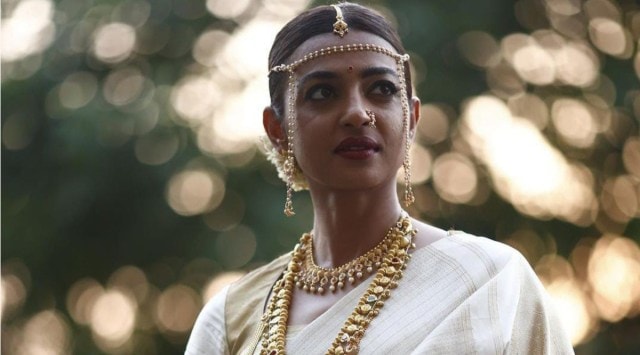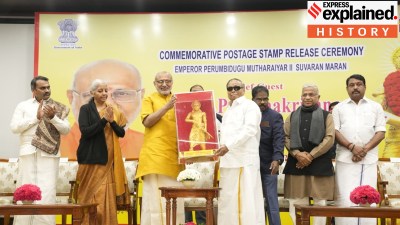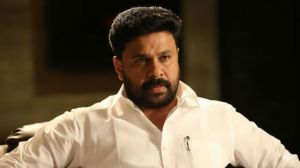Click here to follow Screen Digital on YouTube and stay updated with the latest from the world of cinema.
Radhika Apte opens up about facing racism in England, addresses Yashica Dutt-Made in Heaven controversy
Radhika Apte opens up on Made in Heaven 2 and the author Yashica Dutt demanding formal credit for an episode of the show.
 Radhika Apte plays a Dalit bride in Made In Heaven season 2.
Radhika Apte plays a Dalit bride in Made In Heaven season 2. Made In Heaven season 2 released earlier this month and has been an instant hit and a conversation starter for most OTT content consumers. One of the most talked about episodes in the hit series has been ‘The heart skipped a beat’ featuring actor Radhika Apte as a Dalit bride who stands up for herself and her identity, demanding a Dalit wedding ceremony. Radhika says that he could understand the crux of the episode as she herself has faced discrimination based on her gender and skin colour.
Radhika, in this interview with indianexpress.com, opens up about her takeaway from the show and addresses the controversy where journalist Yashica Dutt alleged that the character is based on her and that credit is due.
View this post on Instagram
Excerpts:
This is the first time we saw a Dalit wedding on TV. What was your reference while you were preparing for the show?
It was so important for that to come out in the mainstream. I have never attended a Dalit wedding and I don’t have a reference point. I have some Dalit friends, and I actually, for this particular show my main reference point was Neeraj (director Neeraj Ghaywan), all the detailed, extensive chats we’ve had and he was extremely kind and open about his own life and experiences and it helped me in order to portray the character (Pallavi Menke) to the best of my capacity.
Neeraj and some other friends’ experiences also helped me understanding it. But honestly speaking, when the episode dropped and we received the immensely overwhelming response, it made me realise that I really have no idea what it feels like to be Dalit because people are so overwhelmed by just the fact that it is shown in mainstream TV. If that can break people and make them cry, I definitely don’t understand what it feels like to be Dalit.
View this post on Instagram
The episode sets the spotlight on the delicate subject of casteism. What has been your understanding of the issue?
I can’t even claim to understand what it is, what it feels like to be Dalit. But, I have other references to know what it feels like to be discriminated against and treated as somebody inferior, and that’s my gender. So, I understand that feeling. Or sometimes my skin colour, like not at the moment but when I visited England for the first time, a lot of parts of England, not London specifically, were very racist, I mean they still are very racist sometimes. And as a woman it is a battle every day to make your voice heard at the cost of being called difficult. You stand up for yourself at every given point, you’re asking for equal rights at all points… so, trying to take from my own experiences and find a connection with Pallavi Menke for being a woman and Dalit, both, was my attempt and I tried to do best.
The Dalit wedding in this season is grand, something a bigger chunk of the community might not have the privilege to.
Ya, I agree. But you should talk to the makers about it. It is how Made In Heaven functions, it is about very rich people. I won’t be able to comment more on it. It is the choice of the makers, right? It is like if there is a film about a poor family in a slum then the question is why not the rich family, it is similar. The set up is such, they are talking about the very very elite class of Delhi, I am guessing, but I am not a part of the creators at all.
View this post on Instagram
What were your discussions with Neeraj Ghaywan were like?
There are two things — firstly, of course it is Neeraj’s life and his experiences, he told me a lot about when he was in Poona (Pune) and the things that sort of happened and how he felt. So we discussed that a lot and he told me a lot of things about the movement, which I did not know. Neeraj loves to do every scene in many many ways. So, we tried to do each scene where we played it differently, with different emotions and intentions. We would just keep going and discussing ‘how about we do it like this, or that…’ if it wasn’t for our lovely showrunner Vasundhara (Koshy) asking us to stop. For me, as an actor, it was a treat, and I really enjoyed working with Neeraj.
View this post on Instagram
Dalit journalist and writer Yashica Dutt has claimed that her life and words were woven into the narrative of this particular episode of the series without proper acknowledgment. Your take?
I, as an actor, go by the vision and the script of the creator and the director. I like the part that they have envisioned on the screen, it would really not be right for me to comment any further on this as I am not the creator. However, having said that I do appreciate and I do feel that both the sides of this conflict, they both do believe that what has happened by representing a Dalit wedding in a mainstream TV show has only good effects and good consequences and the both are hoping that they continue. So, I think that’s a good thing.
What’s your takeaway from the show?
I think it allows representation. All the episodes talk about something, that’s my understanding of the show. My takeaway from the show was how Neeraj balanced Pallavi’s character. She stands up for herself at every point but she also falters because she is constantly made to feel that she’s being difficult and a troublemaker. I really relate to that so I have decided never to use the word troublemaker for me or think that I am difficult or I am causing problems. These are negative words with negative connotations and what we are doing is not actually causing trouble, we are just trying awaken people, it is part of the revolution for equal rights — whether it is gender, caste or religion. That’s my takeaway, and I think it is dealt really wonderfully in the episode.
- 01
- 02
- 03
- 04
- 05


































